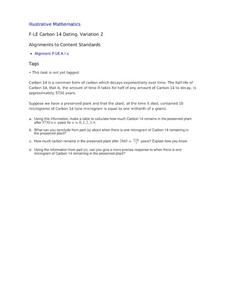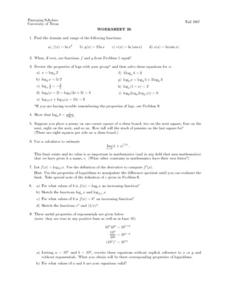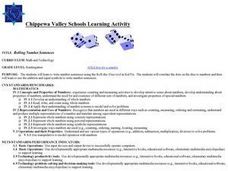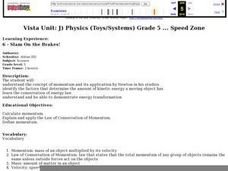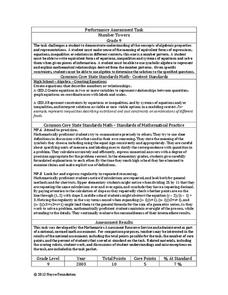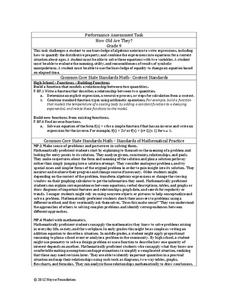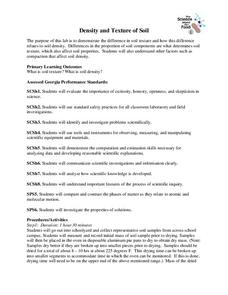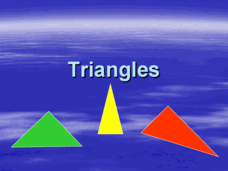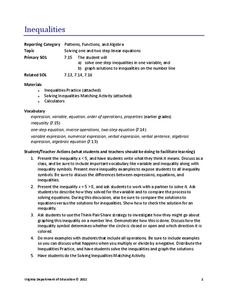Curated OER
Power Laws
In this power laws worksheet, students solve and complete 6 different types of problems. First, they express each using powers and write in index form with a given base. Then, students calculate each problem and write in simplest terms.
Curated OER
Density - An Introduction
Students experiment with objects of different densities. In this density lesson, students examine same-sized objects with different weights, then look at a teacher explanation of density. Students make wave bottles and a density jar to...
Curated OER
Solving Linear Equations
Ninth graders solve linear equations. In this algebra lesson, 9th graders discuss the steps for solving linear equations and work through examples with the teacher. They work in pairs to create their own linear equation and complete a...
Curated OER
Solving Equations
In this Algebra II worksheet, 11th graders use the properties of equality to solve multi-step equations in one variable. The tow page worksheet contains explanation, guided examples, and fifteen practice problems. Answers are not...
EngageNY
Triangle Congruency Proofs (part 2)
Looking to challenge your students that have mastered basic triangle congruence proofs? A collection of proofs employ previously learned definitions, theorems, and properties. Pupils draw on their past experiences with proofs to...
EngageNY
Triangle Congruency Proofs (part 1)
Can they put it all together? Ninth graders apply what they know about proofs and triangle congruence to complete these proofs. These proofs go beyond the basic triangle congruence proofs and use various properties, theorems, and...
Curated OER
Rocks and Minerals
Students investigate the properties and uses of rocks and minerals. They build towers using only one material from a pile of stones, tiles, wood, etc. provided by the teacher. Students test the hardness of rocks by scratching them with...
Curated OER
Carbon 14 Dating, Variation 2
Your archaeologists begin this task with a table of values to estimate the time passed based on the half-life of Carbon 14 remaining in a plant. They then move on to find when a specific amount of Carbon 14 is present in the same plant,...
Curated OER
Worksheet 26 - Functions & Logarithms
In this function and logarithms worksheet, students find the domain and range of functions, use the properties of logs to solve equations. This one-page worksheet contains nine multi-step problems.
Curated OER
Rolling Number Sentences
Budding mathematicians investigate how to write number sentences using the Roll-the-Dice tool in "Kid Pix". They correlate the dots on the dice to numbers and then learn to use the addition and equal symbols to write number sentences....
EngageNY
How Do Dilations Map Angles?
The key to understanding is making connections. Scholars explore angle dilations using properties of parallel lines. At completion, pupils prove that angles of a dilation preserve their original measure.
Curated OER
Slam On the Brakes!
Fifth graders study the concept of momentum and its application by Newton in his studies. They view a demonstration and complete an experiment with toy cars on a racetrack that shows them the properties of momentum and how velocity and...
EngageNY
The Angle-Angle (AA) Criterion for Two Triangles to Be Similar
What do you need to prove triangles are similar? Learners answer this question through a construction exploration. Once they establish the criteria, they use the congruence and proportionality properties of similar objects to find...
Inside Mathematics
Number Towers
Number towers use addition or multiplication to ensure each level is equal. While this is common in factoring, it is often not used with algebraic equations. Solving these six questions relies on problem solving skills and being able to...
Science Geek
Ionic Bonding
Here's a presentation that answers the age-old question of the covalent bond to the ionic bond, "Why won't you share?" Included is information about covalent and ionic bonds, the octet rule, ionic compounds, cations versus anions, and...
EngageNY
Base Angles of Isosceles Triangles
Build confidence in proofs by proving a known property. Pupils explore two approaches to proving base angles of isosceles triangles are congruent: transformations and SAS. They then apply their understanding of the proof to more complex...
Inside Mathematics
How Old Are They?
Here is a (great) lesson on using parentheses! The task requires the expression of ages using algebraic expressions, including the distributive property. Pupils use their expressions to determine the individual ages.
University of Georgia
Density and Texture of Soil
All soil is not created equal! A lab activity asks learners to collect and analyze soil. Specific calculations determine the amount of sand, silt, and clay in a sample and allow individuals to identify the soil texture.
Curated OER
Lab Activity: Model of the Planets
This worksheet leads the class through the calculations needed to construct circles to represent the planets of our Solar System. The actual values are provided, as are suggested calculations to create the scale diameters. The ten...
Curated OER
States of Matter
Properties in measurement, pressure and viscosity of solids, liquids, and gases are the main topics covered in this slideshow. The explanations of Pascal's, Bernoulli's, and the Venturi effects are very clear. Easy to understand diagrams...
Curated OER
Isosceles Triangles
In need of a fun way to define an isosceles triangle? This activity has learners fold a paper in half and then cut it to create an isosceles triangle. They determine the line of symmetry by folding the triangle in half and then use the...
LABScI
Viscosity: The Fluid Lab
There's more to fluids than meet the eye—they include gases, liquids, and polymers, too! Scholars complete three hands-on activities exploring different properties of fluids. They explore viscosity by measuring the resistance, or...
Mathematics Vision Project
Linear and Exponential Functions
Provide a continuous progression to linear and exponential functions. Pupils continue to work with the discrete functions known as sequences to the broader linear and exponential functions. The second unit in a series of nine provides...
Virginia Department of Education
Inequalities
Not all resources are created equal — and your class benefits! Scholars learn how to solve one-step inequalities using inverse operations. They complete an activity matching inequalities to their solutions.









